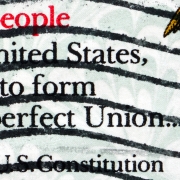For July 3 and 4, 2019, we are re-publishing two of our earlier posts on the subject of the American tradition of individualism.
Individualism is nothing new. Though it may be less familiar today, it was one of the chief ideas that animated the founding of the United States almost 250 years ago. Our nation was built upon the virtues of individual responsibility and self-reliance. Our Constitution was formed around the concepts of limited government and individual liberty. These values — which lie at the heart of individualism — were at the forefront of the Founding Father’s minds as they shaped the political, economic, and cultural institutions of the budding nation.
The Founders placed a particularly high value on individual liberty. Consider these words by John Adams:
“Liberty must at all hazards be supported. We have a right to it, derived from our Maker. But if we had not, our fathers have earned and bought it for us, at the expense of their ease, their estates, their pleasure, and their blood.”
Adams and his contemporaries believed that liberty was worth defending no matter the cost. Patrick Henry said it best with his now-famous line, spoken one month before the start of the Revolutionary War: “Give me liberty, or give me death!”
The Founding Fathers understood liberty as the right of each individual to pursue his or her own desires, ambitions, and interests, so long as they did violate the rights of other individuals in the process. Thomas Jefferson enshrined liberty as a natural right in the Declaration of Independence, proclaiming that all have the right to “life, liberty, and the pursuit of happiness.” He later elaborated on his idea of liberty as follows:
“… Rightful liberty is unobstructed action according to our own will within limits drawn around us by the equal rights of others. I do not add ‘within the limits of the law,’ because law is often but the tyrant’s will, and always so when it violates the right of an individual”
Here, Jefferson introduces another concept that is essential to America and to individualism: limited government. Though the government has the power to pass and enforce laws, it does not have the authority to violate the rights of individuals. Any law that violates the rights of an individual is illegitimate, and any government that enforces such laws is tyrannical.
In his First Inaugural Address, Jefferson more clearly articulated the limits of government power:
“A wise and frugal government… shall restrain men from injuring one another, shall leave them otherwise free to regulate their own pursuits of industry and improvement, and shall not take from the mouth of labor the bread it has earned. This is the sum of good government.”
Again, Jefferson asserts that individuals ought to be free to pursue their own economic and personal interests. Jefferson also states that the government does not have the right to take from an individual that which he or she has rightfully earned. This is another core tenet of individualism. Today, heavy taxation and social entitlement programs are accepted as the norm by many academics and policymakers. However, the Founding Fathers were firmly opposed to collectivist arguments that sought to justify the redistribution of wealth by the government. Here’s Jefferson again:
“To take from one, because it is thought his own industry and that of his fathers has acquired too much, in order to spare to others, who, or whose fathers, have not exercised equal industry and skill, is to violate arbitrarily the first principle of association, the guarantee to everyone the free exercise of his industry and the fruits acquired by it.”
The Founding Fathers were adamant proponents of individual liberty and limited government — two values that have formed the basis of every modern individualist society. But how did the Founders feel about individualism itself? Join us for Part 2 to find out.









